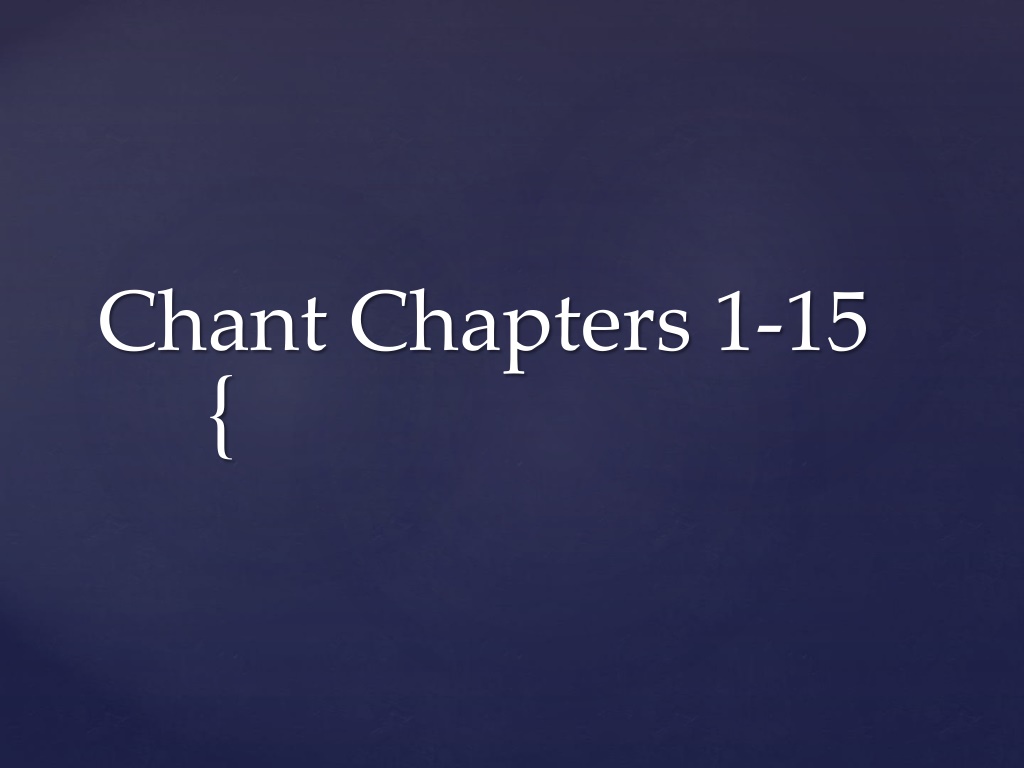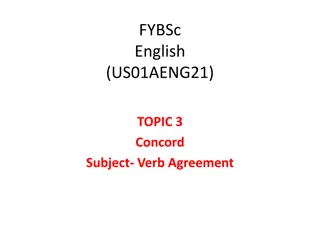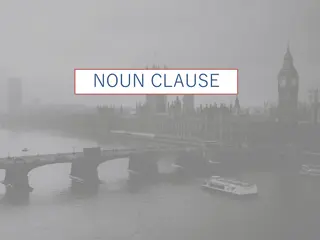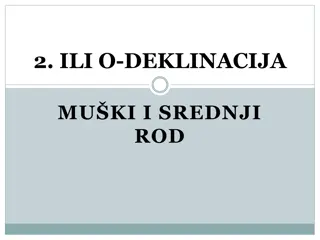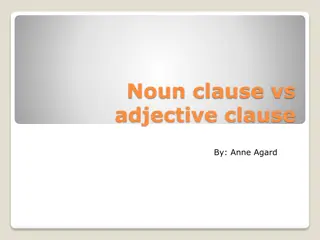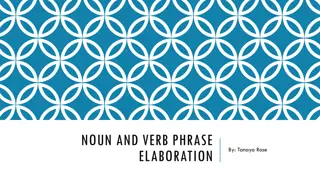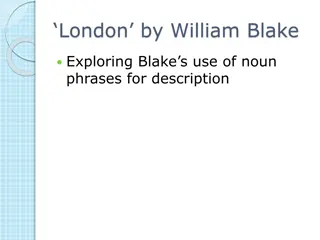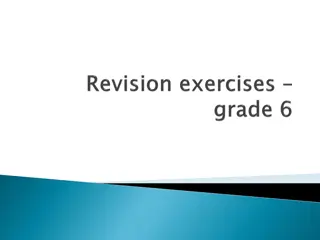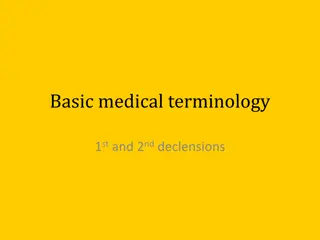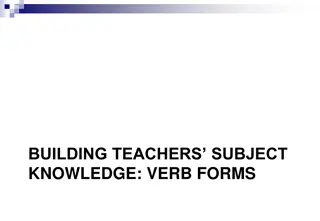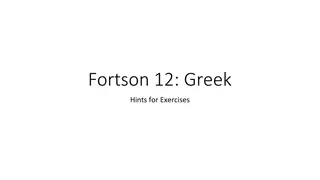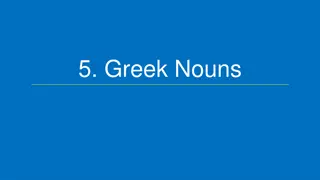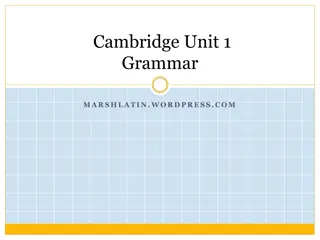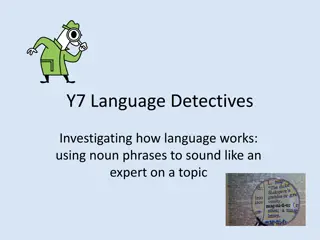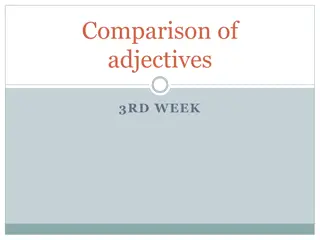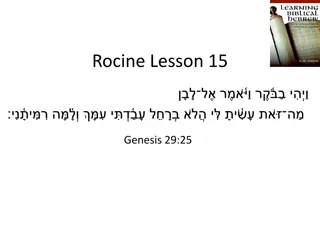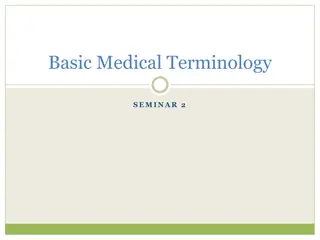Greek Language Verb Forms and Noun Declensions Overview
Explore verb forms and noun declensions in the Greek language through detailed images and descriptions. Learn about present active and middle/passive indicative verbs, shape of the future, imperfect active paradigm, and more. Practice pronouns and delve into the structure of the Greek language effortlessly.
Uploaded on Sep 17, 2024 | 0 Views
Download Presentation

Please find below an Image/Link to download the presentation.
The content on the website is provided AS IS for your information and personal use only. It may not be sold, licensed, or shared on other websites without obtaining consent from the author.If you encounter any issues during the download, it is possible that the publisher has removed the file from their server.
You are allowed to download the files provided on this website for personal or commercial use, subject to the condition that they are used lawfully. All files are the property of their respective owners.
The content on the website is provided AS IS for your information and personal use only. It may not be sold, licensed, or shared on other websites without obtaining consent from the author.
E N D
Presentation Transcript
2-1-2 Noun Forms 2 1 2 lo<goj grafh< i[ero<n lo<gou grafh?j lo<g& graf^? i[er&? lo<gon grafh<n lo<goi grafai< i[era< lo<gwn grafw?n lo<goij grafai?j lo<gouj grafa<j i[era< i[erou? i[ero<n i[erw?n i[eroi?j
3rdDeclension Chants xa<rij xa<ritoj xa<riti xa<rita xa<ritej xari<twn xa<risi(n) o]no<masi(n) pi<stesi(n) xa<ritaj o]no<mata o@noma o]no<matoj o]no<mati o@noma o]no<mata o]noma<twn pi<stij pi<stewj pi<stei pi<stin pi<steij pi<stewn pi<steij
Present Active Indicative Verbs lu<w lu<eij lu<ei lu<omen lu<ete lu<ousi(n)
Present Middle/Passive Indicative lu<omai, -o<meqa, -^, -esqe, -etai, -ontai
Shape of the Future in Greek lu<sw lu<somen lu<seij lu<sete lu<sei lu<sousi(n)
Future Middle Paradigm lu<somai, --omeqa, --^, --esqe --etai, --ontai I will loose for myself
Imperfect Active Paradigm of lu<w Singular Plural e@luon I was loosing We were loosing e]lu<omen e@luej e]lu<ete You were loosing You all were loosing e@lue(n) e@luon S/he/it was loosing They were loosing Learn: e@luon: n, s, e, men, te, n
Imperfect Middle/Passive of lu<w e]luo<mhn: -ou, -eto, -omeqa, -esqe, -onto I was being loosed
Person Personal Pronoun Chant Nom. e]gw< su < h[mei?j Gen. mou Dat. moi Acc. me se sou soi h[mw?n h[mi?n h[ma<j au]to<j, au]th, au]to< (he, she, it)
The "is" verb PAI -- ei]mi< ei]mi< ei# e]sti<(n) e]sme<n e]ste< ei]si<(n)
The "was" verb IAI -- ei]mi< h@mhn h#j h#n h#men h#te h#san
Second Aorist Active Paradigm e@labon n, s, e, men, te, n I took/received
Second Aorist Middle e]geno<mhn -ou, -eto, -omeqa, -esqe, -onto I became
Aorist Stem Changes -- 9 to know e@rxomai == h#lqon (I came, went) o[ra<w == ei#don (I saw) ble<pw le<gw == ei#pon (I said) ba<llw == e@balon (I threw) gi<nomai == e]geno<mhn (I became) ginw<skw == e@gnwn (I knew) eu[ri<skw == eu$ron (I found) e@xw == e@sxon ( I had) lamba<nw == e@labon (I took)
1st Aorist Active Paradigm e@lusa: --, j, e, men, te, n I loosed
1st Aorist Middle Paradigm e]lusa<mhn: -w, -ato, -ameqa, -asqe, -anto I loosed for myself
Aorist Passive Chant: e]lu<qhn n, j, --, men, te, san
Future Passive luqh<somai --^, etai, omeqa, esqe, ontai
Perfect Active Paradigm le<luka --, j, e, men, te, si I have loosed
Perfect Middle/Passive Paradigm le<lumai sai, tai, meqa, -sqe, -ntai I have been loosed
Rapping the Lords Prayer Pa<ter father our the one in heaven a[giasqh<tw to> o@noma< sou make holy name your e]lqe<tw h[ basilei<a sou: let come kingdom your genhqh<tw to> qe<lhma< sou, let be will your h[mw?n o[ e]n toi?j ou]ranoi?j:
Rapping the Lords Prayer w[j e]n ou]ran&? kai> e]pi> gh?j: as in heaven also on earth to>n a@rton the bread our h[mw?n to>n e]piou<sion sh<meron: daily give us today do>j h[mi?n
Rapping the Lords Prayer kai> a@fej h[mi?n ta> o]feilh<mata h[mw?n: and forgive us trespasses our w[j kai> h[mei?j a]fh<kamen as also we have forgiven toi?j o]feile<taij h[mw?n the ones trespassing us
